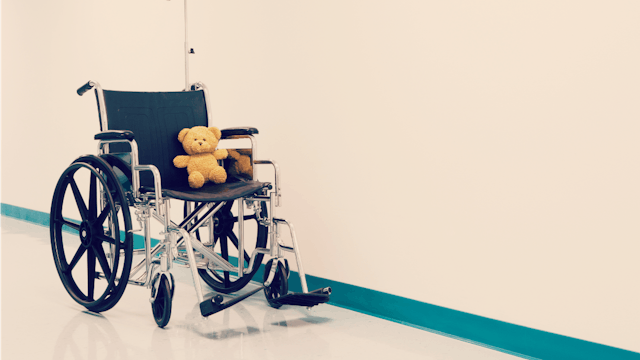Our Daughter Was Dying From Cancer. Here's What Helped Us.

Our daughter Laila should have turned 17 this year, but we lost her to cancer when she was within candle-blowing distance of turning four. In the midst of this devastatingly unlucky situation, we had one stroke of good fortune: because we lived in London at the time, Laila received her treatment from Britain’s National Health Service, a government-funded, single-payer health care system, where medical care is free for everyone.
We rarely thought about this fact during Laila’s six-month illness. Why would we? During her six-month stay in London’s Great Ormond Street Hospital, we were preoccupied with caring for our fierce little girl. Besides, having already lived in the UK for several years, it no longer felt strange to walk out of the doctor’s office without paying anything, or to pick up a no-cost prescription for one of the kids.
I now realize that being able to ignore the financial side of Laila’s treatment was an incredible luxury. It’s also exactly what should happen in any civilized society.
In the United States, the idea of freedom is sometimes equated with a lack of government involvement in daily life, including in health care delivery. We found the opposite to be true.
When Laila’s alarming symptoms first appeared—tending to get worse after-hours, something familiar to any parent—we had the freedom to take her to the emergency room multiple times in search of an explanation. We bundled her up in her favorite yellow blanket and rushed her there without pausing to consider hefty ER co-pays or whether an insurance company would agree that mysterious fevers, a lack of interest in Dora the Explorer, and my something-is-not-right maternal sense constituted a true, reimbursable, emergency.
After doctors finally fit all the odd puzzle pieces together into the picture we least wanted to see—a diagnosis of a rare and aggressive cancer—the British health care system continued to offer us freedom.
Instead of spending endless hours on the phone with health plan representatives, we had the freedom to snuggle up next to Laila in her hospital bed and sing along to her favorite Disney movies.
Instead of reading menacing letters from insurance companies disputing the need for this or that test or procedure, we read Laila fairy tales with menacing villains, transporting her to worlds far beyond the confines of her hospital room.
Instead of looking at crazy numbers on hospital bills, worrying that we might be responsible for some portion of those eye-popping charges, we laughed at zany drawings on get-well cards from Laila’s nursery school classmates.
We saw how government-funded services offered freedom to other families on the ward, too.
One family had come to Great Ormond Street Hospital from a village in northern England so that their tiny daughter could be treated by the country’s top specialists. This girl’s parents and brother stayed in free lodging near the hospital, at government expense. A dad in another family was given government-subsidized leave from his job so he could help take care of his son. Laila’s little friend from down the hall had enough of a remission from her neuroblastoma to return temporarily to school. The government assigned her an aide to accompany her and tutor her at home. All these families had the freedom to stay close to their sick children, to carry on with their lives in as normal a fashion as possible, and to not have their medical tragedies also become financial ones.
In the end, the only hospital bill we paid over that whole six-month period was Laila’s tab at Great Ormond Street’s Peter Pan cafe, where, on her good days, we wheeled her down so she could tuck into big plates of sausage and mashed potatoes.
Which means that British taxpayers paid for everything else, including Laila’s staggeringly expensive stem cell transplant. Yes, strangers helped us in our time of need, just like the 45-year-old Welsh man who anonymously donated his stem cells to Laila. This is how it works in a humane society. Someone gets a bad break, and the system is set up to cushion the blow. Anyone could be there someday…anyone could be there any day.
Within weeks of moving back to the United States after Laila died, I spotted a flyer in a grocery store for a spaghetti-dinner fundraiser to help defray the costs of cancer treatment for someone in the community. I saw this flyer in an appalling new light. Why should people have to scrape and beg to pay for their cancer care?
Now, having been back here more than a decade, it once again seems sadly normal for medical care to be a privilege and not a right. But as debate continues to rage over the future of health care in this country, I often think of our British experience.
Thankfully, protections for families that were part of the Affordable Care Act have remained in place, for now. Insurance companies cannot charge pediatric cancer survivors higher premiums because they are at lifelong risk for secondary health problems. More families on Medicaid means that fewer families will experience the terrifying situation of facing cancer uninsured or minimally insured.
But can’t we do even better? Shouldn’t every family affected by serious illness have the freedom to put payment concerns aside and focus only on their loved one, like we did with Laila?
Achieving universal access to high-quality medical care is not easy, and there may be multiple ways to do it. But however we do it, and however long it takes, we need to aim high. We may never be able to take away the suffering that cancer causes families, but we can at least put a cap on it.
Originally published on Motherwell.